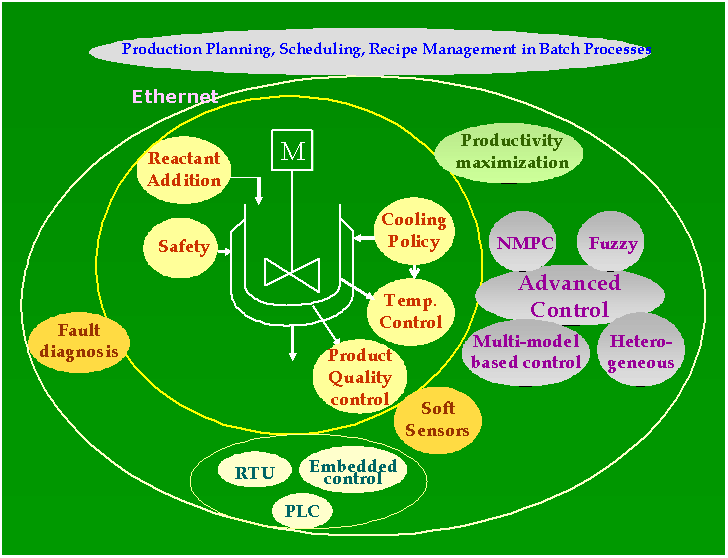|
The manufacturing environment today is
changing with intense competition, tighter requirements on product
quality and stringent guidelines on environmental compliance. The
need to have Good Manufacturing Practices (GMP) in place will soon
become mandatory especially in the drug and pharmaceutical sector.
However, a majority of the current day batch process plants are
not fully geared to adapt to GMP norms that are being laid down.
Batch process industry constitutes a significant segment of the
Indian chemical industry and is engaged in the manufacture of a
wide range of chemicals, pharmaceuticals and consumer products.
Batch plants with their inherent flexible structure provide
several challenges and opportunities for the manufacturer. They
could be used in a multi-purpose manner to produce a slew of
products based on the market demand and economics. There are many difficulties
 in implementation of GMP in the batch process industries. Batch
processes are often poorly instrumented. Often there is a lack of
quantitative knowledge of the process characteristics. Even in
cases where there is adequate instrumentation, there has been no
concerted effort to use the available batch process data to gain a
better understanding of the process behavior so as to operate the
processes better. The problem is further compounded by the fact
that on-line measurement of quality is difficult and one has to
rely on periodic off-line measurement of product quality. It is in
this context that one has to view the prospects of low cost
automation as a means to address the problems encountered in the
batch process plants. Low cost automation needs to be viewed as
judicious blend of hardware and software, scaled and configured to
address various operational and control functionalities outlined
below.
in implementation of GMP in the batch process industries. Batch
processes are often poorly instrumented. Often there is a lack of
quantitative knowledge of the process characteristics. Even in
cases where there is adequate instrumentation, there has been no
concerted effort to use the available batch process data to gain a
better understanding of the process behavior so as to operate the
processes better. The problem is further compounded by the fact
that on-line measurement of quality is difficult and one has to
rely on periodic off-line measurement of product quality. It is in
this context that one has to view the prospects of low cost
automation as a means to address the problems encountered in the
batch process plants. Low cost automation needs to be viewed as
judicious blend of hardware and software, scaled and configured to
address various operational and control functionalities outlined
below.
Batch Process Monitoring. Low cost data acquisition
systems can be used to monitor some of the key process
variables like temperature, pressure, pH, conductivity etc.
Batch to batch data of these variables can provide the basis
for developing correlations |
|
|
between these and product quality variables.
Multivariate statistical analysis tools like Principal
Component Analysis (PCA), Projection to Latent Structures (PLS),
and Multi-way PCA etc., can be used for such inferential
measurements to provide the soft sensors for tracking the product
quality. These tools which permit viewing the process performance
can be used for tracking the process behavior and evolve protocols
for statistical process control. At the Chemical engineering
Department of IIT Bombay work is in progress on the development of
soft sensors and improved process monitoring using multivariate
statistical methods. Low Cost Automation Framework. It will be
desirable to evolve the framework in accordance with Batch process
standards of ISA as an open architecture which could integrate
embedded systems, PLCs, data acquisition systems and supervisory
computers. The use of Real Time Linux operating system could be
considered as an option to reduce the software costs.
Batch
Process Control. The nonlinear
and dynamic nature of batch process operation makes the batch
process control problem rather complex. Batch process data can be
used to develop Tendency Models for depicting the
chemical transformations and generate Calorimetric Models
for depicting the thermal effects. With the ability to track
process runaway, one can plan for more aggressive policies for
batch reactor control with faster reaction completion and better
control of conversion. Batch distillation is another operation
used widely in the process industry. Through modeling one can
develop optimal operational policies permitting higher recovery of
costly products, as well as recycle policies which minimize
reprocessing cost. Studies conducted at IIT Bombay have shown
immense potential for application of these strategies in batch,
semi-batch(fed-batch) reactor control and batch distillation
operations.Batch Process Management.
With tighter control of batch operations at the plant level, it is
possible to pay attention to higher manufacturing goals, such as
higher productivity, better capacity utilization, energy
conservation and flexible manufacturing. Batch process planning
through formal optimization tools help in evolving production
plans to meet set operational goals. The use of appropriate
scheduling strategies helps in ensuring delivery of desired
products as per the deadlines and reduction of in-plant inventory.
Work is in progress at IIT Bombay on the development of planning
and scheduling strategies for batch and semi-continuous processes.
|
|